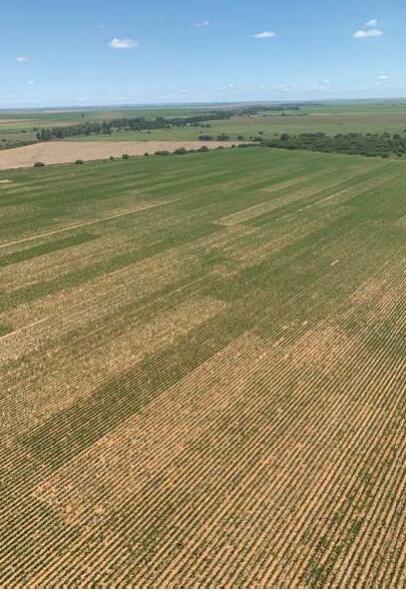
Modern precision farming equipment, data-evaluation programmes, and digitalisation are paving the way for the introduction of altered cultivation practices on the one hand, but on the other, they also dramatically increase the complexity of running a farming operation. The relationship between a farmer and researcher or agronomist is also changing and becoming more complex.
One of the oldest and most labour-intensive activities in the world is now changing rapidly into a smart, data-driven industry. To keep pace with the changes, farmers are also compelled to embrace this digital, connectivity-fuelled transformation in agriculture in order to address production, marketing, traceability, and sustainability challenges. One can safely say that the agriculture sector is in the midst of a revolution, where artificial intelligence (AI), data and analytics are at the centre. The industry is counting on these digital technologies to further increase yields, improve resource-use efficiency, and build sustainability and resilience across crop cultivation and animal husbandry.
'I TRULY BELIEVE THAT THESE EXPERIMENTS ARE THE NEXT STEP IN PRECISION FARMING THAT CAN PROVIDE US WITH THAT ADDITIONAL 5% PRODUCTIVITY'
The tools at the fingertips of farmers, agronomists and plant breeders today would be almost impossible to imagine for those who were involved in agriculture a century ago. These tools are opening many doors to breeding, yield and production improvement, resource-use efficiency, sustainability and, in the end, food security.
Most farmers will agree that when it comes to gathering data, they are successful. But they need to go a step further: the data must be analysed and converted into information that they can apply in a practical manner to improve their farming management practices. The data should be turned into actionable insights.
TURNING DATA INTO ACTION
This story is from the {{IssueName}} edition of {{MagazineName}}.
Start your 7-day Magzter GOLD free trial to access thousands of curated premium stories, and 9,000+ magazines and newspapers.
Already a subscriber ? Sign In
This story is from the {{IssueName}} edition of {{MagazineName}}.
Start your 7-day Magzter GOLD free trial to access thousands of curated premium stories, and 9,000+ magazines and newspapers.
Already a subscriber? Sign In

New farmers' seedling pitfalls
Inexperienced farmers may be tempted to grow seedlings from seed themselves, but they have much to gain by trusting a seedling grower at a nursery to perform this task for them instead

South African avocado production: a success story
Avocado production in South Africa has expanded markedly since the industry's humble beginnings over 80 years ago. From a small grove planted in 1938 in what was then Nelspruit, the industry has blossomed to seven million trees planted on 20 000ha. Dr Guy Witney, project manager at Great Brak Avos, spoke to Annelie Coleman about the country's avocado production.

Unlocking value through livestock exports
Exporting livestock might sound like a daunting business that's better left for big companies, but Gerrie Ferreira, who farms near Oudtshoorn in the Western Cape, has been doing it successfully for almost 30 years, sometimes in partnership with other breeders. He spoke to Glenneis Kriel about the huge potential this market holds, and offers some advice for farmers who are contemplating going this route.

An agribusiness's dedication to community upliftment
For agribusiness NWK, located in Lichtenburg, North West, corporate social investment is an important part of creating a positive influence alongside financial returns. Johan Bezuidenhout, NWK’s group manager of corporate marketing and communication, spoke to Annelie Coleman about why the company chooses to invest millions of rands in the area it operates in every year.

Empowering dreams, transforming lives
Since its launch in 2013, the Agri's Got Talent competition has revolutionised the lives of many farmworkers by unlocking their hidden talents and fostering a culture of empowerment. Glenneis Kriel spoke to various finalists about how the contest has changed their lives.

Foreign investment: agriculture maintains its appeal
South Africa remains a popular destination for foreign investors, despite an often negative outlook from its citizens. It is a gateway to Africa, and with its counterseasonal production to the Northern Hemisphere and favourable weather, local agriculture is especially well placed to attract foreign interest, bringing with it hope for rural communities

The real value and message of COP29 for SA agriculture
While the 2024 Conference of the Parties may have disappointed those who hoped for real progress, it's more important for South African agriculture to highlight its role in carbon mitigation

Improving efficiencies in feed and grain milling
Bühler, a Swiss-based company that provides solutions and equipment for various industries, including food and animal feed processing, has pledged that by 2025, it will deliver scalable solutions that will reduce energy, waste and water by 50% in the value chains of its customers.

Tips for better olive production
At an SA Olive Association field day in November, industry experts shared ways to improve olive production efficiencies, from soil preparation to harvesting.

More effort needed to protect vulnerable cheetah
On International Cheetah Day, commemorated every year on 4 December, emphasis was placed on the vulnerability of the species.